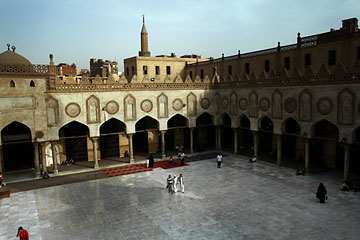
Cairo's al-Azhar Mosque, founded in the 10th century, remains the focal point of the university
(2 of 4)
That austere version of the faith, known by some as Salafism and by others as Wahhabism, has been backed by Saudi oil. Mosques built with Saudi money have, in recent years, been constructed in cities and towns all over the Muslim world, including Egypt. Without a Caliph to guide it from Istanbul and with al-Azhar's authority muffled by successive despots, mainstream Sunni Islam has been largely leaderless for decades. "It's a much more decentralized world out there than it used to be, in terms of religious authority in the Muslim world, and the rise of Saudi Arabia has allowed it to fund its own approach very lavishly," notes Nathan Brown of the Carnegie Endowment for International Peace in Washington. "Inside Egypt, Azhar is seen not only as an Egyptian institution but Egypt's gift to the Islamic world." The question now is, As al-Azhar awakens from its 60-year enforced slumber, what shape will that gift to the Islamic world take?
Mahmoud Alpha, who arrived at al-Azhar from Ivory Coast seven years ago, wants the university to retain its moderate image. "I prefer the centrist ideology," he says. Like 6 out of 10 students, he studies religion, although al-Azhar added degrees in secular fields such as engineering and agriculture when it gained university status in the early 1960s. "The picture of Islam in the world has become a frightening picture," he says. "Whenever people see explosions, they think of Islam or Muslims. What we see in Nigeria, what we see in Mali, that is not a true picture of Islam. The meaning of Islam is one of peace."
Alpha sits at an outdoor table beneath a sign reading CHINESE MUSLIM RESTAURANT, a greasy-spoon diner whose clientele testifies both to the global reach of al-Azhar and the diversity of a community that is, whatever Islam's popular image, at most 20% Arab. To Alpha's right, a Malian student shares a plate of noodles with a Uighur from western China's Muslim Xinjiang province. To his left, a table of Malaysian men and Egyptian women pass around dumplings the size of coin purses. "I live in the student dorms, and there are 99 different nationalities around me and 4,000 students," says Alpha.
Most of them carried to Cairo some version of the ambition that fires the lanky African. After completing his master's degree in the politics of Islamic law, Alpha aims to return to Abidjan to help build moderate religious institutions under the country's first Muslim President, the former IMF official Alassane Ouattara. The way for the future imam will be greatly eased by his status as an Azhari — the term for a graduate of the most esteemed seat of Islamic learning in the world.
Al-Azhar is nearly as old as Cairo itself. The mosque that long housed the religious school was built in 972 by the Fatimids, Shi'ite conquerors from Tunisia who founded the city. Al-Azhar became Sunni 200 years later when Egypt did, and it set about outstripping every other center of Islamic learning. The Ottomans who governed the Middle East for 400 years nodded dutifully to the scholars of al-Azhar even though Istanbul was home to the Caliph, the political ruler of the world's Sunni Muslims. What Cairo had, as the place where the faith's most learned scholars gathered to deliberate religious law, was the center of gravity that accumulated with consensus, key in Sunni jurisprudence. (Unlike the Shi'ite clergy, who have a hierarchy topped by Grand Ayatullahs, Sunni imams answer only to God.)
Still, al-Azhar was never far removed from Egyptian politics. It thrived when Egypt was loosely held by Britain, and it was placed under state control in 1961 after Egyptians embraced the secular nationalism of Gamal Abdel Nasser. A reputation built over 1,000 years is not undone in a few decades, however, and when Egyptians took to Tahrir Square in revolt against dictatorship in January 2011, al-Azhar played a memorable role. A phalanx of students wearing the university's traditional red caps and white turbans locked arms to protect the demonstrators from state security personnel. The spectacle was a stirring signal that Mubarak's time was up — and that the sleeping giant that is al-Azhar had begun to stir.
There really is nothing else like it. "The importance of Azhar is its international legitimacy," says George Fahmi, a researcher at the Arab Forum for Alternatives, a Cairo think tank. "They have this moral power. You cannot refuse Azhar."
